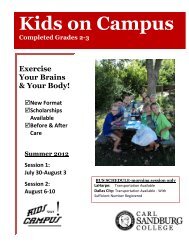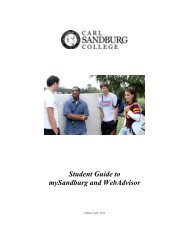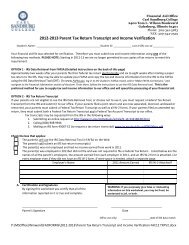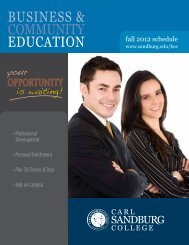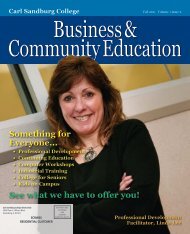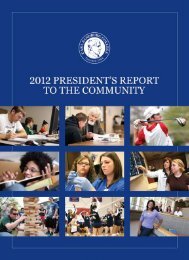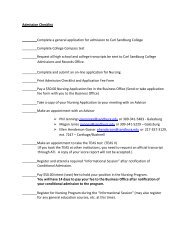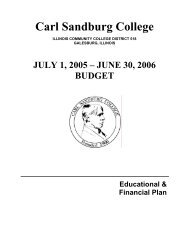S T U D E N T - Carl Sandburg College
S T U D E N T - Carl Sandburg College
S T U D E N T - Carl Sandburg College
Create successful ePaper yourself
Turn your PDF publications into a flip-book with our unique Google optimized e-Paper software.
tips for success<br />
1<br />
Know what each instructor<br />
expects for assignments and<br />
for classes in general<br />
Plans for success may be a little different<br />
for each course. If ever in doubt about<br />
course or assignment objectives,<br />
students should ask the instructor for<br />
further clarification.<br />
2Take initiative<br />
Students should take advantage of the<br />
freedom and responsibility involved<br />
with plotting their academic, and<br />
by extension, professional futures.<br />
Additionally, success in college is much<br />
more contingent on student effort and<br />
achievement than high school.<br />
3Develop a strong<br />
working relationship<br />
with an academic advisor<br />
While it is primarily the student’s<br />
responsibility to understand degree<br />
requirements, it is always wise to have<br />
experienced professionals’ assistance in<br />
making course selection decisions.<br />
4 5<br />
Discover the most effective<br />
learning strategies<br />
The less structured college environment<br />
allows students to take a more active<br />
role in processing course material. Try<br />
different study habits and tactics, ask<br />
around to see what works for others and<br />
experiment to find the most effective<br />
learning strategies.<br />
Don’t be afraid to ask for help<br />
Everyone at <strong>Sandburg</strong> is committed to<br />
helping students succeed. In addition<br />
to offering help themselves, instructors<br />
and advisors can provide information<br />
about the support available for<br />
students at <strong>Sandburg</strong>.<br />
6Find the Library and<br />
become familiar with it<br />
The Library offers many resources in<br />
addition to scholarly books and articles.<br />
Find out what they are and use them.<br />
7<br />
Find out what is available<br />
through Academic<br />
Support Services<br />
As well as providing support for students<br />
with disabilities, Academic Support<br />
Services provides free tutoring in many<br />
subjects through the Tutoring Center or<br />
online. Go to the Quicklinks menu at<br />
www.sandburg.edu for online tutoring.<br />
8Know school and individual<br />
instructor policies that affect<br />
student outcomes<br />
For example, the “No Show You Go”<br />
policy is a school-wide policy stating<br />
that a student who fails to attend class<br />
for the first four days is dropped from<br />
the course.<br />
9<br />
Develop a working<br />
relationship with the<br />
Financial Aid office staff<br />
They are an excellent resource for<br />
discovering available funding and<br />
alerting students to funding eligibility<br />
requirements, which include, but are not<br />
limited to, completing 67 percent of hours<br />
attempted, maintaining a 2.0 grade-point<br />
average and completing the program<br />
within allotted hours.<br />
10<br />
Talk to your instructor<br />
before deciding to<br />
withdraw from a class.<br />
See Page 18 for procedures and FAQs on<br />
withdrawing from a class.<br />
11Petition to graduate<br />
Students must petition to graduate in<br />
order to receive their diploma. If you will<br />
have enough credit hours to graduate<br />
at the end of a semester, contact<br />
Angela Snow, assistant registrar, at<br />
309.341.5233 or asnow@sandburg.edu.<br />
16<br />
17



